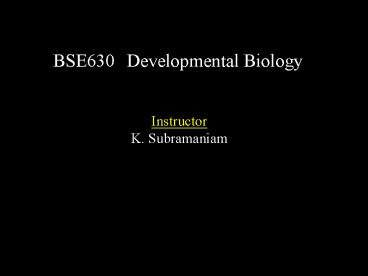BSE630Developmental Biology
1 / 12
Title:
BSE630Developmental Biology
Description:
Genetics of axis formation in Drosophila. Axis formation in amphibians ... We think we have a good candidate in the form of a small nematode worm, ... –
Number of Views:53
Avg rating:3.0/5.0
Title: BSE630Developmental Biology
1
BSE630 Developmental Biology
Instructor K. Subramaniam
2
Developmental Biology Teaching Program at BSBE
Two courses Developmental Biology I Basic
concepts Early embryo
Developmental Biology II Late embryogenesis
organ development immune system
specialized tissues Developmental diseases
3
BSE630 Developmental Biology I Course content
- Principles of developmental biology
- Introduction
- Life cycles and evolution of developmental
patterns - Experimental embryology
- Genetic basis
- Differential gene expression
- Cell-cell communication
- Early embryonic development
- Fertilization
- Early invertebrate development
- Genetics of axis formation in Drosophila
- Axis formation in amphibians
- Early vertebrate development
4
Developmental Biology I
Recommended Text Book Developmental
Biology By Scott F. Gilbert Seventh or Eighth
edition Publishers Sinauer Associates
5
Developmental Biology I
Exam schedule Three exams I and II mid-terms
and Final All exams will carry equal weight
Style Descriptive, problem-solving,
experimental approach and interpretation Will
require reasoning and interpretation skills Will
require ability to remember!!!
6
The classical era of molecular biology answered
the basic questions about life.
DNA (the blueprint of an organism)
mRNA (a transcript from DNA)
1940s to 1960s
Ribosome tRNA
Protein
Biological function
7
Can we find a simple multicellular organism to
address the questions of developmental biology?.
.all the classical problems in molecular
biology have either been solved or will be solved
in the next decade. The army of large numbers of
American and other biochemists into the field
will ensure that all the chemical details of
replication and transcription will be
elucidated
.I have long felt that the future of molecular
biology lies in the extension of research to
other fields of biology, notably development and
the nervous system.
.Part of the success of molecular genetics was
due to the use of extremely simple organisms
which could be handled in large numbers
8
Sydney Brenners vision To understand thyself,
understand a worm.
.Thus we want a multicellular organism which
has a short life cycle, can be easily
cultivated, and is small enough to be handled in
large numbers, like a micro-organism.
.We think we have a good candidate in the form
of a small nematode worm,
.To start with we propose to identify every
cell in the worm and track lineages. We shall
also investigate the constancy of development and
study its genetic control by looking for
mutants.
9
What is developmental biology?
???
10
Questions of Developmental Biology
1. Cellular differentiation
11
Questions of Developmental Biology
2. Morphogenesis
12
Questions of Developmental Biology
3. Growth 4. Reproduction 5. Evolution 6.
Environmental Integration































